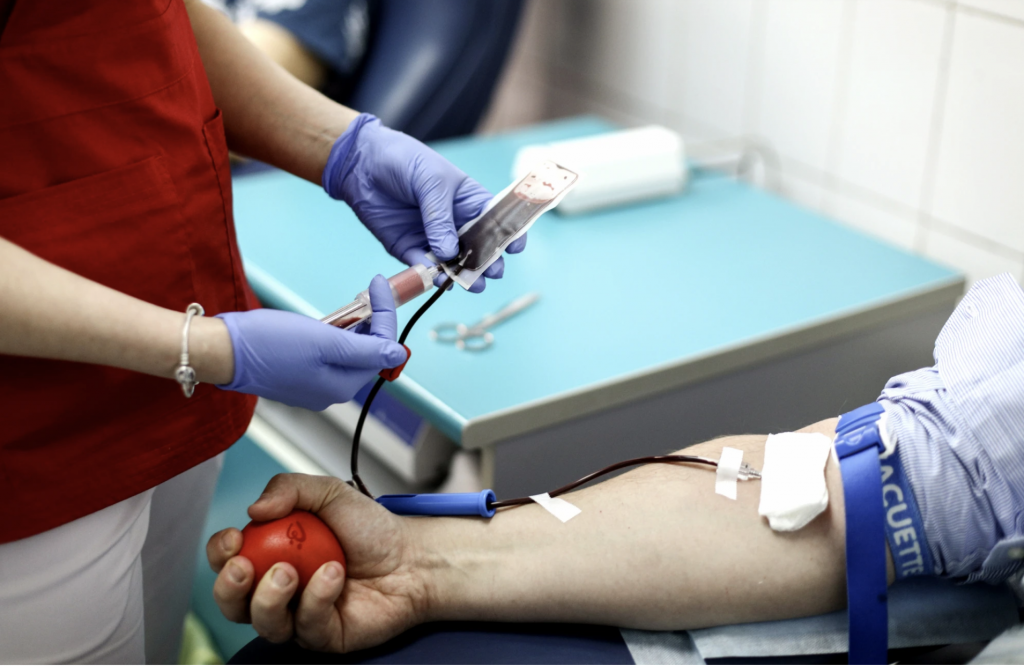
We Need Blood, Just Not Yours: Lingering Restrictions on Blood Donation for Men who have Sex with Men (MSM)

Historical perspective: discriminatory policy or useful screening tool?
Since the 1980s, the U.S. Food and Drug Administration (FDA) has maintained restrictive policies preventing men who have sex with men (MSM) from donating blood.1 Recognizing the HIV virus could be transmitted through blood—one of the most famous examples being Ryan White, an 18-year-old who died from complications of HIV after a blood transfusion—the U.S. has remained firm in its stance to restrict MSM donation. However, since the height of the AIDS epidemic, a time when little was known about HIV transmission routes or risk factors, screening methods have improved dramatically.9 Proponents of restrictive blood donation policies cite the fact that screenings are never 100 percent effective, putting some at risk of HIV infection via transfusion. Conversely, human rights activists have called for a reform of these discriminatory policies based on heterosexist perceptions and not scientific fact.7,13
Bans are discriminatory, not based on sound science
The American Medical Association stated in 2013 that “the lifetime ban on blood donation for men who have sex with men is discriminatory and not based on sound science.”1 At the urging of the AMA and human rights organizations, the FDA lifted its lifetime ban for MSM blood donation in 2015. The revised mandate required a 12-month period of deferred sexual contact to qualify for donation, sufficient time to detect bloodborne sexually transmitted infections.3 Despite screening over 12 million units of donated blood each year, it is estimated that 10 HIV-infected units enter the donation pool—questionnaires are a way to eliminate high risk groups to further reduce screening errors.3,13 However, as a result of blood shortages during the COVID-19 pandemic, the FDA further amended its policies in 2020 to allow donation after 3 months of sexual abstinence for MSM.
Questionnaires may restrict racially diverse samples
Prior to donating blood, potential donors are asked a series of pre-screening questions that determine risk factors—assessing travel history, general health, and past exposures to blood-transmitted diseases.12 According to the FDA, this pre-screening questionnaire eliminate donors with blood-borne infections like HIV and hepatitis by up to 90 percent.3,4 Some argue that these questionnaires are unnecessarily discriminatory: some questions assess donors’ travel history to localities with a high prevalence of Malaria, for example, restricting donations from those who have visited or lived in places such as sub-Saharan Africa which can affect black communities’ ability to give blood.12
As it turns out, these questions may not only prevent MSM from donating, but may restrict racially diverse samples. According to the American Red Cross, less than 3% of blood donors identify as African American although they comprise 13% of the U.S. population.2 Blood transfusions depend on sameness to prevent negative reactions to foreign antigens: A, B, AB and O are the major blood groups (in addition to being positive or negative for the Rh factor), but over 360 known antigens — intricate combinations of proteins and sugars — exist.4 Patients who require regular blood transfusions for disorders such as thalassemia, sickle cell, or leukemia, many from Africa or of African descent, may find it difficult to find the diverse blood they require.3 The Red Cross only stopped segregating blood in 1950.6 Although Norman H. Davis, the president of the American Red Cross in the 1940s, admitted that segregating blood was largely “a matter of tradition and sentiment rather than of science,”5 the historical precedent of racial discrimination may doubly stigmatize black MSM, preventing them from donating or receiving needed blood. Within this population, already with a high prevalence of medical mistrust and a concomitant lower utilization of medical services, expanding inclusion may encourage more donations from African American and Black donors.2
Present regulations discriminate on sexuality, not sexual risk-taking
On the advice of the Blood Products Advisory Council, the FDA’s Center for Biologics Evaluation and Research establishes blood donation regulations in the U.S. Despite their claims that screening is not always accurate, necessitating a screening questionnaire, the present regulations discriminate based on sexuality rather than sexual behaviors.13 The policy as it is written assumes that MSM are higher sexual risk takers: but what about MSM in a monogamous relationship? Or MSM who utilize condoms during sexual encounters? In its current form, heterosexuals who have had multiple sexual partners or engage in higher sexual risk-taking (condomless sex, anal sex, sex with multiple partners, etc.) would be allowed to donate while MSM would be eliminated outright from donation regardless of if they were in a monogamous partnership or if they engaged in limited sexual risk-taking according to the screening questionnaire’s exclusion criteria. This policy assumption inherently stigmatizes MSM, further marginalizing this sub-population.
Interestingly, blood donation eligibility is not restricted for transgender individuals, but they are forced to self-report their gender dichotomously—male or female. Those who identify as male who indicate they have had sex with men in the past three months are excluded from donating blood according to the current criteria. Alternatively, transgender individuals who self-identify as female are not deferred from donating for engaging in sexual contact with men, despite their sex at birth being male. This perhaps exposes the arbitrary nature of this policy, one that clearly discriminates against MSM.13
The need for further studies on sexual risk taking, equal evaluation of donors
Obviously, the integrity of blood donations is crucial, and donations need to be appropriately screened to ensure the health of recipients. However, the government must reevaluate its questionnaire to assess sexual risk-taking more broadly rather than automatically restricting donations from MSM who have had sex in the past 90 days. Further studies on sexual risk taking can ensure donors are equally evaluated and aren’t unnecessarily marginalized, rather than being restricted on the basis of sexual orientation or gender identity.
Recently, England, Scotland and Wales have partially lifted restrictions for MSM blood, plasma and platelet donation.8 The UK’s FAIR (For the Assessment of Individualised Risk) steering committee proposed several suggestions to make blood donation more equitable that could be adopted in the U.S.10 Regardless of sexuality, the UK’s screening questionnaires ask donors regardless of gender identity if they have had anal sex with new or multiple partners in the last 90 days, eliminating restrictions for MSM who have only engaged in oral sex or who are involved in long-term monogamous relationships. This change will also require asking all donors to report their sexual history, a more equitable approach to ensuring the safety of blood donations without the associated stigma often attached to gay, bisexual, and MSM donors.7,8,10
A welcome change: making blood donation less discriminatory against MSM, particularly MSM of color
“We welcome [this] change, which will help ensure more gay and bi men can donate blood and represents an important step towards a donation selection policy entirely based on an individualised assessment of risk,” said Robbie de Santos, Director of Communications and External Affairs for Stonewall, a UK-based lesbian, gay, bisexual and transgender rights charity.11 “We want to see a blood donation system that allows the greatest number of people to donate safely and we will continue to work with Government to build on this progress and ensure that more people, including LGBT+ people, can donate blood safely in the future.”11
The U.S. can follow suit to make blood donation more equitable and less discriminatory against MSM, particularly MSM of color.
References:
BCPHR.org was designed by ComputerAlly.com.
Visit BCPHR‘s publisher, the Boston Congress of Public Health (BCPH).
Email [email protected] for more information.
Click below to make a tax-deductible donation supporting the educational initiatives of the Boston Congress of Public Health, publisher of BCPHR.![]()
© 2025-2026 Boston Congress of Public Health (BCPHR): An Academic, Peer-Reviewed Journal
All Boston Congress of Public Health (BCPH) branding and content, including logos, program and award names, and materials, are the property of BCPH and trademarked as such. BCPHR articles are published under Open Access license CC BY. All BCPHR branding falls under BCPH.
Use of BCPH content requires explicit, written permission.